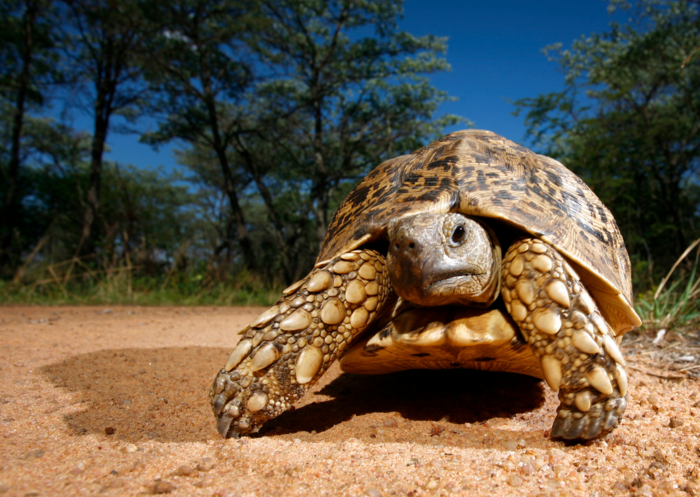Even though humans live longer lives compared to their historical counterparts, we cannot escape the inevitability of aging and death. However, testudines – the order to which tortoises and turtles belong – may buck this trend by following a different pattern of aging compared to humans and other species.

Credit: Getty Images/Canva.
Even though humans live longer lives compared to their historical counterparts, we cannot escape the inevitability of aging and death. However, testudines – the order to which tortoises and turtles belong – may buck this trend by following a different pattern of aging compared to humans and other species.
Evolutionary theories of aging predict that all living organisms weaken and deteriorate with age (a process known as senescence) – and eventually die. Now, researchers from the Species360 Conservation Science Alliance and the University of Southern Denmark show that certain animal species, such as turtles and tortoises, may exhibit slower or even absent senescence when their living conditions improve.
In a new study published in Science, researchers used data from the Species360 Zoological Information Management System (ZIMS) to examine 52 species of turtles and tortoises living in zoos and aquariums globally. They found that, unlike humans and other species, turtles and tortoises defy common evolutionary theories and may reduce the rate of aging in response to improvements in environmental conditions. In fact, most of them age slower, and in some cases, their senescence is negligible.
Out of 52 turtle and tortoise species, 75% show extremely slow senescence, while 80% have slower senescence than modern humans.
“We find that some of these species can reduce their rate of aging in response to the improved living conditions found in zoos and aquariums, compared to the wild,” said study co-author, Prof. Dalia Conde, Species360 Director of Science, Head of the Species360 Conservation Science Alliance, and Associate Professor at the Department of Biology, University of Southern Denmark.
Some evolutionary theories predict that senescence appears after sexual maturity as a trade-off between the energy an individual invests in repairing damages in its cells and tissues and the energy it invests in reproduction, so its genes are passed to the next generations.
This trade-off implies, among other things, that, after reaching sexual maturity, individuals stop growing and start experiencing senescence, a gradual deterioration of bodily functions with age.
Turtles keep growing after sexual maturity
Theories predict that such trade-offs are unavoidable, and thus senescence is inevitable. In fact, this prediction has been confirmed for several species, particularly mammals and birds.
However, organisms that keep growing after sexual maturity, such as turtles and tortoises, are believed to have the potential to keep investing in repairing cellular damages and are thus thought to be ideal candidates for reducing and even avoiding the harmful effects of aging.
“It is worth noting that the fact that some species of turtle and tortoise show negligible senescence does not mean they are immortal; it only means that their risk of death does not increase with age, but it is still larger than zero. In short, all of them will eventually die due to unavoidable causes of mortality such as illness,” said another of the researchers behind the study, Dr. Fernando Colchero, Principal Statistical Analyst, Species360 Conservation Science Alliance, and Associate Professor at the Department of Mathematics and Computer Science, University of Southern Denmark.
About the Species360 Conservation Science Alliance
The Species360 Conservation Science Alliance works to harness the value of data found in the Zoological Information Management System (ZIMS) and other global data sources for the advancement of science and species conservation. The Conservation Science Alliance is a global coalition of 240 research partners, led by Species360’s Director of Science, Prof. Dalia Conde, and includes a team based at the University of Southern Denmark. Through the work of the alliance, research like this study on senescence in tortoises and turtles is possible, enhancing knowledge about the animal kingdom.
This study has been made possible thanks to the more than 1,200 Species360 member institutions and record-keepers that regularly collect and curate data on wildlife worldwide. Non-profit Species360’s ZIMS is the largest database of animal knowledge globally, which is crucial to unlocking critical insights into species to aid in their care and conservation.
Read the article here: https://www.science.org/doi/10.1126/science.abl7811
About Species360:
- Species360 is a global non-profit that facilitates international collaboration in collecting, sharing, and analyzing knowledge on wildlife.
- Species360 maintains the Zoological Information Management Systems (ZIMS), which is trusted and used by more than 1,200 aquariums, zoos, wildlife centers, sanctuaries, universities, and governmental organizations in 101 countries around the world.
- ZIMS is the world’s most comprehensive database of knowledge on more than 22,000 species, increasing vital information about the animal kingdom.
- ZIMS is used to establish best practices in aquatics, husbandry, enrichment, medical care, animal welfare, reproduction, population management, and conservation, and to provide Global Medical Resources to wildlife professionals worldwide.
- The Species360 Conservation Science Alliance is a global alliance of 240 research partners, led by Species360’s Director of Science, Prof. Dalia Conde. It includes a team based at the University of Sothern Denmark.
- The Conservation Science Alliance harnesses the power of aggregated data in ZIMS and transforms it into scientific information to inform animal welfare and conservation decisions.
- For more information: www.species360.org
Journal
Science
DOI
10.1126/science.abl7811
Method of Research
Data/statistical analysis
Subject of Research
Animals
Article Title
Slow and negligible senescence among testudines challenges evolutionary theories of senescence
Article Publication Date
23-Jun-2022
COI Statement
Authors declare that they have no competing interests.




